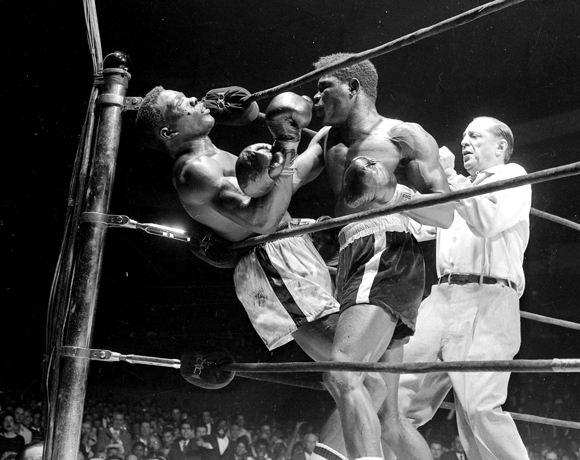In the twelfth round of their 1962 fight, Emile Griffith forced Benny Paret into the ropes with a right cross that stunned and sent him stumbling back to the corner of the ring. The fight was practically over with Paret struggling to even protect himself. Yet Griffith followed that punch with, by my count, twenty-six more, uncontested punches before the slow-acting referee, Ruby Goldstein, finally moved in to stop the fight. As Griffith celebrated his victory, Paret still with his back against the ropes, slowly slid into a seated position with his legs crumbling beneath his body. His head tilted towards his left shoulder, his right arm hanging from the second rope, Paret’s trainer and a doctor arrived within seconds. They quickly unfolded his legs and laid him on his back—a more dignified position, fitting for a former world champion.
As other officials gathered around Paret, the ring announcer went about his job, calling out over the microphone, “The time: two minutes and nine seconds of the twelfth round. The winner by a knockdown and once again welterweight champion of the world, Emile Griffith.” At that point, no one knew how serious Paret’s injuries were with the television commentator concerned but stating he looked more exhausted than anything else. Although Paret moved his legs, he could not walk and doctors and trainers carried him out on a stretcher. After the fight and still unaware of the seriousness of Paret’s condition, Griffith said, “When I saw Paret hurt, I want him to be on the ground before the fight was stopped. I wanted to keep punching. I was still eager to put him down.”[1]
Immediately taken to the hospital, doctors diagnosed Paret with a cerebral laceration and drilled holes into his skull to relieve pressure from swelling. When Griffith learned of the injury’s seriousness, he “wept inconsolably.”[2] Ten days after the fight, aged twenty-five, Paret died. Griffith did not intend to kill Paret though there was a deep animosity between them, formed out of their three fights against each other. Griffith’s dislike of Paret stemmed from being called a maricón by Paret. In fact, during their weigh-in before their third fight, Paret moved behind Griffith, grabbed his buttocks, thrusted his pelvis towards him and said, “Hey maricón, I’m going to get you and your husband.”[3] “He called me maricón,” said Griffith. “Maricón in English means faggot.”[4] And while it is unclear how much the slur had to do with the tragic result, the point is that Paret used the term, knowing how hurtful it was to Griffith who struggled with his sexuality.
Griffith remained haunted by the death of his opponent, waking up from nightmares during the middle of the night to see Paret standing at the foot of his bed.[5] When he did not wake up to find Paret’s ghost, Griffith dreamed of greeting Paret on the street, shaking his hand only to find it cold as ice. Other times, he dreamt of sitting at a boxing event next to Paret, watching two boxers attempting to kill one another with every punch they threw.[6] Understandably, Griffith became afraid—not just of nightmares but also of sleep and extended moments of silence. He was also afraid of opening yet another hate-filled letter from Latinos convinced that Griffith killed Paret, a Cuban, on purpose.[7] “I didn’t want to kill no one,” Griffith said, “But things happen.”[8]
A few days ago, “things happened“ again just as they did forty-four years ago. On Friday night Scottish boxer Mike Towell died—unable to recover from injuries he sustained during the previous night’s bout. There was no background of name-calling or attacks on another’s masculinity to distinguish this boxing death from others. As it should, the following days will have renewed calls to ban boxing as there has been after every boxing death. Ultimately, little will change aside from maybe a few slight rule changes that help ease the boxing fan’s and official’s conscience. No deep pondering of what our level of complicity is in all of this, no serious movement to organize a boxer’s union that might help protect boxers, and certainly no boycott of future fights. Instead, we will say some romantic bullshit like, “Mike Towell died like a true warrior, boxing until the very end.”
A few months from now, nothing will change and even worse, most people—myself included—will have forgotten Mike Towell’s name. It will just be a name on the long list of meaningless, boxing-related deaths.
Towell left a partner and a son, you can help raise money for them through an online fundraiser set up by Ricky Hatton. https://www.justgiving.com/crowdfunding/Iron-Mike-towell
[1] Gilbert Rogin, “The Deadly Insult” Sports Illustrated, April 2, 1962.
[2] “Paret in Surgery After Knockout” New York Times, March 25, 1962.
[3] Ibid.
[4] Richard Goldstein, “Emile Griffith, Boxer who Unleashed a Fatal Barrage, Dies at 75” New York Times, July 23, 2013.
[5] Lance Pugmire, “Emile Griffith dies at 75; champion boxer struggled with his sexuality” Los Angeles Times, July 23, 2013.
[6] Gary Smith, “The Shadow Boxer” Sports Illustrated, April 18, 2005.
[7] Ibid.
[8] Goldstein, “Emile Griffith, Boxer who Unleashed a Fatal Barrage, Dies at 75” New York Times.
Originally published on Thaboxingvoice.com
Photo: Charles Hoff/NY Daily News Archive/Getty.

